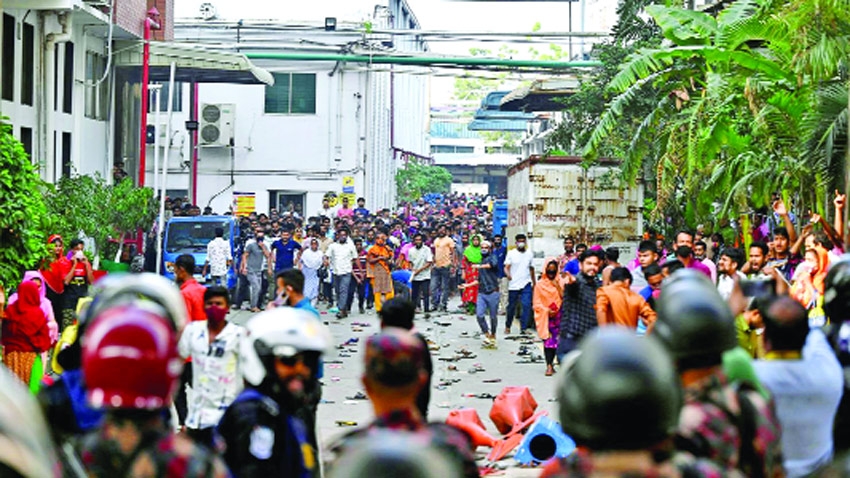Published: 09:02 AM, 17 November 2025
Economic infirmities further deteriorate

Clashes often break out between industrial workers and police force in Dhaka and some other cities in Bangladesh as a result of factories being laid off and employees losing their jobs on a broad scale. -Getty Images
Several indexes of Bangladesh's economy have been undergoing a steep nosedive for last one year. A stalemate in foreign direct investment and a downtrend in domestic demands are being reflected by export wheels slowing down, lack of eagerness among traders to open letters of credit (LCs) while people's confidence on Bangladesh's banking system is slimming down. Liquidity crisis in a broad number of scheduled banks, dollar shortage and gas disconnections in industries have drastically augmented the all out critical woes which have added bigger perils to the country's economy and industrial sector.
It has meanwhile hit news headlines over and over again that more than 200 factories have been laid off in Dhaka city, Narayanganj, Savar, Gazipur and Chittagong during last one year through which over 1 hundred thousand workers have lost their jobs. Most of these laid off factories were connected with producing readymade garments.
Political analysts and business leaders have said that pulling out Bangladesh from these dire predicaments will be too tough a work if the ongoing restless political circumstances cannot be settled down immediately. Mob violence, absence of rule of law and widening disagreements between the major political parties have further jeopardized Bangladesh's economic prospects leading to steep decline in exports and escalating unemployment. Jobless people are demonstrating in various parts of Bangladesh including Dhaka city every week. Political situations have become all the more troublesome as the International Crimes Tribunal has in the meantime declared dates for issuing verdicts on ousted Prime Minister Sheikh Hasina.
Former Director General of Bangladesh Institute of Development Studies (BIDS) Dr. Mustafa K Muzeree has told journalists that the current political dilemma has badly affected foreign direct investment in Bangladesh. Most of the entrepreneurs are not showing willingness to invest their funds under the ongoing political infirmities in Bangladesh.
Dr. Mustafa K Muzeree said that the bogged down status of the country's private sector can't be expedited without establishing a firm, effective and elected government. Otherwise unemployment, economic growth and industrial expansion will run into severe impediments, Dr. Mustafa K Muzeree warned. He added that investment climate cannot improve in the middle of perilous political phenomena.
Bangladesh Garments Manufacturers and Exporters Association (BGMEA) President Mahmud Hasan Khan has said that graduation from least developed countries (LDC) before ensuring uninterrupted gas and electric supply to factories and rectifying Bangladesh's investment scenario will lead to more critical hindrances. Mahmud Hasan Khan voiced serious worries about the rising numbers of readymade garments being shut down one after another and the job losses hitting millions of RMG employees as a result. According to Mahmud Hasan Khan, ease of doing business is very thin and weak in Bangladesh which discourages local as well as foreign investors to engage their money in Bangladesh's industrial arena.
Surveys by different learned institutions have shown that the number of jobless people has increased by 3 lakh 30 thousand within just one year. High inflation and unbearable loan interest rates have darkened business prospects across Bangladesh, financial sources have told The Asian Age.
Bangladesh Bank's Chief Economist Dr. Akhter Hossain said that dollar availability is currently stable and dollar prices are not too high either at present. Opening letters of credit (LCs) has slightly declined due to sharp surveillance on foreign trade for halting illegal money transfer, Dr. Akhter Hossain further said.
International Monetary Fund (IMF) has predicted that Bangladesh's GDP growth will rise to 4.9 percent at the closure of 2025-2026 fiscal year. GDP growth was 3.8 percent during 2024-2025 fiscal year. Asian Development Bank (ADB) has calculated that GDP growth one year later is most likely to reach 5 percent. On the other hand, World Bank has stated that GDP growth will amount to 4.8 percent if the government's reform initiatives are smoothly carried out. Transparency in the banking sector and expanding revenue generation are vital to raise GDP growth according to World Bank.
Work orders from foreign buyers to RMG owners have dropped too. If political hostilities get more intensified in Bangladesh, neighbouring countries like India, China, Vietnam and Thailand will become more preferable choices for RMG clients from abroad, business sources have reported. Improving law and order situation and stern crackdowns on mob gangs are essential to establish rule of law throughout Bangladesh and it is an economic sector requirement too.



